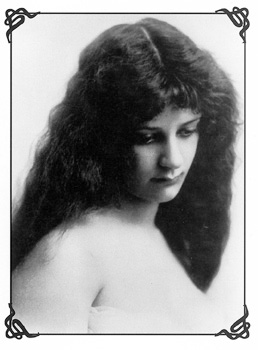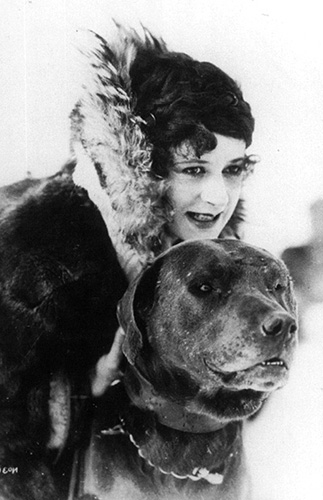NELL SHIPMAN
A Brief History
by Joel H. Zemel © 1997
A Brief History
by Joel H. Zemel © 1997

Nell Shipman was an interesting figure from the early history of the Canadian and American motion picture industries. Although Nell's films would not be considered art or even artistic, she possessed an indefatigable desire to create early action films on her own terms. Her films typically involved nature themes and were some of the first to incorporate location shooting.
She was a stage and screen actress, writer, director, ecologist and animal rights activist. She produced her own independent films until the mid 1920's. As well, she and her husband, Ernest Shipman, were responsible for the production of the most successful Canadian independent silent film, Back To God's Country (1919).
Nell was born Helen Foster Barham in 1892 in Victoria, British Columbia of upper middle-class English parents and started her stage career at the age of thirteen. At eighteen, she became the wife of Canadian theatrical entrepreneur, Ernest Shipman, who was twenty-one years her senior. Two years later took the professional name of "Nell Shipman". Her screenplays were produced by Selig, Universal and Vitagraph, where she was under contract. The Shepherd of the Southern Cross (1914), was a feature film shot in Australia by Alexander Butler and Under the Crescent (1915), based on one of her screenplays, was a six-part serial produced by Universal studios.
In Hollywood, between 1915 and 1918, while under contract to Vitagraph, Nell played the lead roles in a dozen feature films including two based on the works of American novelist James Oliver Curwood: God's Country and the Woman (1915) and Baree, Son of Kazan (1918).
In 1918, Nell nearly died from an epidemic of Spanish Flu that killed millions throughout the world. Following her recovery in that same year, Nell, Ernest and Curwood formed a production company. Their first and only film, produced at a cost of $67,000, and based on a Curwood short story, Wapi, the Walrus (actually a Great Dane), was Back To God's Country (1919) in which she did a nude scene - quite controversial for that time. Nell's crew was made up mostly of expatriate Canadians living in Hollywood. Her choice as director of photography was future Frank Capra cameraman, Joseph Walker. Her Director was Hollywood actor and assistant director, David M. Hartford. Nell wrote the screenplay and played the lead in what was to be the most successful Canadian silent film ever made.


She was a stage and screen actress, writer, director, ecologist and animal rights activist. She produced her own independent films until the mid 1920's. As well, she and her husband, Ernest Shipman, were responsible for the production of the most successful Canadian independent silent film, Back To God's Country (1919).
Nell was born Helen Foster Barham in 1892 in Victoria, British Columbia of upper middle-class English parents and started her stage career at the age of thirteen. At eighteen, she became the wife of Canadian theatrical entrepreneur, Ernest Shipman, who was twenty-one years her senior. Two years later took the professional name of "Nell Shipman". Her screenplays were produced by Selig, Universal and Vitagraph, where she was under contract. The Shepherd of the Southern Cross (1914), was a feature film shot in Australia by Alexander Butler and Under the Crescent (1915), based on one of her screenplays, was a six-part serial produced by Universal studios.
In Hollywood, between 1915 and 1918, while under contract to Vitagraph, Nell played the lead roles in a dozen feature films including two based on the works of American novelist James Oliver Curwood: God's Country and the Woman (1915) and Baree, Son of Kazan (1918).
In 1918, Nell nearly died from an epidemic of Spanish Flu that killed millions throughout the world. Following her recovery in that same year, Nell, Ernest and Curwood formed a production company. Their first and only film, produced at a cost of $67,000, and based on a Curwood short story, Wapi, the Walrus (actually a Great Dane), was Back To God's Country (1919) in which she did a nude scene - quite controversial for that time. Nell's crew was made up mostly of expatriate Canadians living in Hollywood. Her choice as director of photography was future Frank Capra cameraman, Joseph Walker. Her Director was Hollywood actor and assistant director, David M. Hartford. Nell wrote the screenplay and played the lead in what was to be the most successful Canadian silent film ever made.


Unlike her contemporaries, Mary Pickford and Lillian Gish, who portrayed wispy, victimized characters, Nell was strong, well-built and usually ended up saving her man. She became known as "The Queen of the Dogsleds". Two things you could usually find in her films were lots of animals and snow. She also did her own stunt work. While filming at Lesser Slave Lake, Alberta, Nell had an affair with her production manager, Bert Van Tuyle, that would last for the next five years.
During the editing phase of the film, she had a falling out with Curwood. He very much disliked the fact that Nell had shifted the focus of the original story, the Great Dane, Wapi, to the female protagonist, Delores. This marked the end of the Shipman Curwood Producing Company. Although Back To God's Country brought a 300 percent profit to Ernest's Calgary based subsidiary company Canadian Photoplays and grossed over a million and a half dollars in its run, Nell never received remuneration for her work on the film. Nell and Ernest separated and were eventually divorced in 1920.
Soon after, Nell turned her back on Hollywood and decided she would make her own films. She formed her own production company, Nell Shipman Productions and with Van Tuyle as co-director and Walker as DOP, they produced four films: The Trail of the Arrow, a short automobile promo, Something New, a one-hour adventure and two-reeler, Saturday Off, later changed to A Bear, a Boy and a Dog and lastly, The Girl from God's Country, an ambitious, convoluted epic in which Nell played two roles - twin sisters (one evil, one good). The film, with its burgeoning budget, was removed from Nell's control by her backers and cut from twelve to seven reels. Released in September, 1921, it was a box-office failure.
During the editing phase of the film, she had a falling out with Curwood. He very much disliked the fact that Nell had shifted the focus of the original story, the Great Dane, Wapi, to the female protagonist, Delores. This marked the end of the Shipman Curwood Producing Company. Although Back To God's Country brought a 300 percent profit to Ernest's Calgary based subsidiary company Canadian Photoplays and grossed over a million and a half dollars in its run, Nell never received remuneration for her work on the film. Nell and Ernest separated and were eventually divorced in 1920.
Soon after, Nell turned her back on Hollywood and decided she would make her own films. She formed her own production company, Nell Shipman Productions and with Van Tuyle as co-director and Walker as DOP, they produced four films: The Trail of the Arrow, a short automobile promo, Something New, a one-hour adventure and two-reeler, Saturday Off, later changed to A Bear, a Boy and a Dog and lastly, The Girl from God's Country, an ambitious, convoluted epic in which Nell played two roles - twin sisters (one evil, one good). The film, with its burgeoning budget, was removed from Nell's control by her backers and cut from twelve to seven reels. Released in September, 1921, it was a box-office failure.